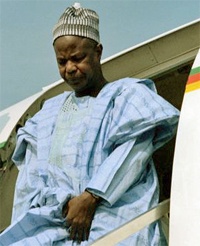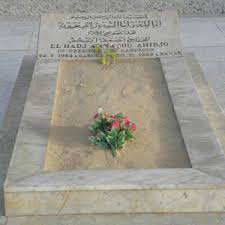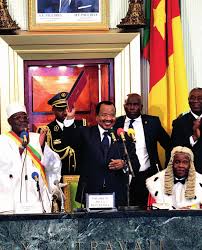The chilling winds made a gentle rock dance with the eucalyptus trees that covered the undulating topography of the town. For its part, the sun had curled a broad grin over the rolling hills before settling on the Boyo Mountain. And so Njinikom lay somnolent in a haze of siesta that fateful Friday November 5, 1982.
As a Form One student of Jua Memorial College, JMC, Njinikom, I had joined my classmates for manual labour on campus. Our anxiety rose as teachers muttered in small groups. As the day grew older, the rumours of President Ahmadou Ahidjo’s resignation, stiffened to a reality.

Only a few people had the privilege of listening to the radio. A few had listened to the previous night’s 8 pm news cast in which the presenter, Jean-Claude Ottou, broke the news of Ahidjo’s resignation. As the news spread across the area in-mouth-to-ear gossips, fear chilled hearts and uncertainty loomed. One old man who wore an intense look of fright asked to know who the new president was.
“What is the name of the new Ahidjo” he asked in all sincerity and curiosity. To him, Ahidjo was a synonym to the President of the Republic. It could be so because Cameroonians had known only one president, El hadj Ahmadou Ahidjo, since independence.
Despite assurances of a peaceful transition, a pall of darkness still loomed over the nation. The fear was inspired from neighbouring Nigeria that was a cauldron of bloody military coups at the time. A logjam of sorts still wrestled in the minds and spirits of Cameroonians. It was not until Saturday, November 6, when a certain 49-year old inherited the insignia of Etoudi power.

A boyishly handsome man mounted the saddle after the “I do so swear” oath at the National Assembly.
Anyone who saw the new President’s photo shot an envious gaze at the man of fine and equal parts. His name, Paul Batholomy Biya Bi-Mvondo, had music of its own, produced vibration and inspired absolute confidence. He attracted people to himself, just the way a magnet would, to iron fillings. With a head that was full of “book” the new President was also endowed with a charisma that was pleasantly intimidating.
The new President roused the masses to frenzy when he promised to divorce with the dictatorial past of his predecessor. He said he was ushering the dawn of a new deal era, an epoch of rigour and moralization. Biya was a cynosure of encomiums and adoration everywhere he went. Even the spineless political hypocrites, who had fallen on Ahidjo’s feet, wailing and begging him not to resign, described him as a blessing and God’s best gift to Cameroonians.
Things, apparently, went on well until 1983 when the hiccups between the new President and his predecessor were blown open. The worst happen in April 1984 when a group of people plotted to overthrow the new President. Even after the coup plotters were neutralized, things were no longer the same. The President became more high-handed because he thought that he was being taken too much for granted.
Since then, Cameroonians went through one sad reality to the other. Even though Biya inherited a vibrant economy with an annual growth rate of 7.5 percent, it has remained in the doldrums. After 37 years of the New Deal, the economic growth has remained at a conservative 4.5 to 5.5 percent. Ordinary Cameroonians have continued to have a sip of the vinegar of hard times ever since Biya announced the arrival of the economic recession in 1987.
Corruption became the order of the day, causing Transparency International to declare Cameroon winner of the world corruption trophy twice. The 1993 salary cuts (by over 70 percent) had fuelled the engine of corruption as it played mischief with the morale of civil servants in the country.
In 2000, the New Deal regime led Cameroon to join the ranks of the Heavily Indebted Poor Countries, Initiative. HIPC-I. Little has changed 13 years after the country reached the HIPC-I completion point that came with debt cancellation. With weak political will, Government has been making laudable efforts in fighting corruption but the scourge has remained resilient.
The political performance of the New Deal in 37 years has been a jeremiad of controversy. It has fought and lost the battle for true democracy to conservative forces at all fronts.
The regime tried in vain to make multiparty politics a stillbirth when it blasted six people to death during the launching of the SDF in Bamenda on May 26, 1990. Even when the eastern political winds imposed multiparty politics in Cameroon, the regime rendered such a development impotent through election rigging.
Small wonder, that the regime used the state apparatus to seize the victory of the opposition in the 1992 Presidential election. It did not end there. It slammed a state of emergency in the North West Province that had mustered the gumption to raise a finger of protest.
There are close to 300 political parties in Cameroon, but only about five are functioning. The rest are mostly satellite political parties of the regime that exist only in the brief cases of their owners. Such parties come out of their shells only during elections to have a share of the national cake.
The New Deal apostle joined the ranks of African sit-tighters when he used the CPDM majority in the Parliament to change the constitution so as to eternalize his stay in power. Young people who came to demonstrate against such a move were ruthlessly crushed. Since then, civil liberties have continued to suffer in the hands of regime.
Public demonstrations and meetings are not permitted in the country if they are tailored to criticize the regime. The New Deal regime will go down in the history annals for having slapped the bloodiest rule in the country by its cruel handling of the Anglophone problem that has led to the death of 3000 people in three years.

The Biya regime will also go down into the annals of history as the one that empowered the ruling party to pocket State institutions. The judiciary and the legislature lack independence. They are mere toys in the hands of the executive.
The silver linings of the 37 years New Deal is that there is freedom of speech as compared to the Ahidjo regime. There is relatively free press in comparative terms. The regime has carried out developments in the socio-economic domains. There are now eight State Universities as compared to the one in 1982, it has brought more schools and health centres.
In the sport domain, Cameroon has had many victories in the African Nations Cup, the hosting of the competition in 2016 and 2021 is a diplomatic victory for the nation.The regime also takes credit for winning the Bakassi dispute.